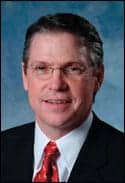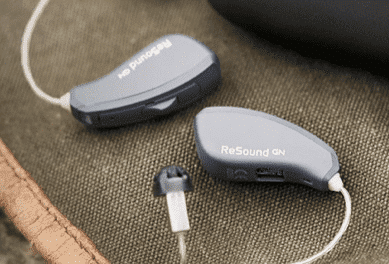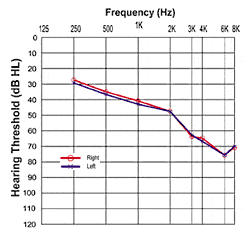
|
| Dan Quall |
Sonus Network, Plymouth, Minn, originated in Canada before moving into the United States in 1996, growing to own 200-some clinics across the country. The company eventually was acquired by the Amplifon Group, and now includes a network of 1,200 independent business owners, representing about 1,800 clinics across the United States. There are also nine Sonus-owned clinics in Canada, although the company does not operate a network program in that country.
Dan Quall, a former audiologist in private practice for 18 years, says despite some views of Sonus as the “Big Giant” in the hearing health care industry, the company is more the “Gentle Giant,” helping hearing health care professionals grow their businesses.
Along those lines, in February, Sonus launched its 2007 Gold Standard Initiative, a networkwide strategic plan to further strengthen the company’s practices.
Q: What was the intent when Sonus started?
A: Sonus … was a concept of a few individuals who at the time were looking at two business aspects: One was the aspect that the industry was ready for consolidation of the audiology side of the business; and the second concept was that, back in the mid-90s, there was a lot of what was called “roll-up” strategies, where you try to create critical mass with a group of stores/clinics, and through their economies of scale and their buying power you can reduce many of your costs and create higher levels of profitability.
Sonus [eventually began] acquiring clinics across the United States with the concept of raising the bar for patient satisfaction through the audiology channel of the business. That was a big and important factor. It was a group of very committed and passionate individuals in the industry wondering, How are we going to create higher levels of patient satisfaction through our medical professional colleagues?
That was the concept: How can we do it better?
We really did sit down and create from an evidence-based factor and said, “What are the things that drive patient satisfaction, and how do we emulate and create programs, products, and systems that can deliver that to our patients across the country?”
Q: Would you say that is still Sonus’ focus?
A: What we have done in the past 6 months to a year is re-entrench and re-establish our position of what we call “The Gold Standard.” We want to be the gold standard in two areas: patient care and clinical protocols, and in business practices.
What we find—and it’s such a classic story in the medical profession—is we are trained so well on all of our technical skills, but they don’t teach us a lot about the business skills. So we have to learn that in the school of hard knocks.
Q: What are the strategies behind Sonus’ Gold Standard initiatives, and how does the company plan to implement them?
A: We started out establishing our Gold Standards in clinical practices by looking at what drives patient satisfaction. In the past year, the company has invested in a couple different initiatives, including focus groups, to help better understand what patients want.
We also globally looked at our three business channels inside Amplifon and asked, “What are the patients saying back to us?” So we did an internal audit of patient satisfaction to identify our strengths and weaknesses. From that, we got feedback that told us what we’re doing well and what we’re not doing well. That was the start of deciding we wanted to be the best, looking at the evidence, and deciding what we needed to do to improve.
We always say, “People do not run your business; systems run your business. People run your systems.” Our objectives became how to improve our clinical protocols—our systems internally—that drive this level of satisfaction.
We also had to address the “product” part because that part is critical. The next question concerns the delivery of the product and services that go with it—which are almost a product themselves—and that’s “How do I present the product, how do I get it on the patient, how do I get it to work with the patient, how do I make the patient say, ‘This is the best thing, I’d never go anywhere else.’ “
And that’s the product we sell, that protocol. So our strategy was, how do we create the best value in service excellence.
We asked ourselves, “What are all the things that have to be done to satisfy the patient from the time the phone rings to the time the patient is satisfied with the instrument, clinically and from a service position?” That became what we call our patient-centered approach.
We took the product and lumped it into a group called the “Sonus Solution,” and that said rather than buying a hearing aid, what you really want to buy is a hearing health care package that says the hearing aid is warranted for 3 years, it comes with 3 years of free batteries, [and] it comes with 3 years of service and upkeep at the clinical level. So the patient knows that when they get that, they’re going to be taken care of. It also comes with a 75-day trial period, so it guarantees the patient is going to have the chance to really evaluate the benefits of that hearing aid, and if it doesn’t work, then we should give them their money back.
When we say the “Gold Standard,” we are setting a leadership position, and we said we want to be the leaders in patient satisfaction.
One of our Gold Standard initiatives dealt with measurement. When you ask professionals, “How many of you measure your patient satisfaction through a survey or other type of measurement?” you get a response of maybe 20%. Maybe. I would guess less. We now measure, in all of our clinics, that satisfaction level. That will be a leadership position for us; we’re not only establishing the Gold Standard and these protocols, but we’re measuring it. This is evidence-based growth, and we’re going to look at how we drive this experience and make it better.
Q: How does the network benefit professionals in the hearing health care industry?
A: The Sonus Network is an affiliation of professional private practices across the country that have the same kind of objectives in mind. What they get when they come together in our organization is a number of business benefits.
We like to say, “Be in business for yourself, not by yourself,” because what we’re trying to do is help them grow.
Part of that is product pricing; we’ve used our power to go to the manufacturers and get pricing they probably couldn’t get on their own and have the wide array of choices we have. As practitioners, they don’t have to get all their units from one manufacturer to get a discount. They can choose for their patients without having to commit all their buying power to one place in order to save money.
What we’re really about is business value and what we can do to help you grow your business.
Sonus offers a number of business programs. Part of it is our clinical protocols. We do what [hearing health care professionals] do every day, but we do it in 200 clinics, so we get a little better feel about what’s working and what’s not. We try to take that clinical experience and that patient satisfaction data to our members so they can see what they need to do to be better.
We also take a number of business programs out to them. We have a retirement program for small businesses under what’s called a 409a program. … At this time, Amplifon has more than $4 million in small business retirement set aside for these folks.
We also believe every clinic these days needs some kind of management system internally, so that means you need to have some kind of computer database that allows you to market to your patients and really evaluate your business; that means benchmarks or scorecarding that tell you whether you’re above or below average. We have those kinds of systems available.
We bring those business measurement tools in, along with a system. When professionals are doing business with us, we have a program where we pay for having that [system] installed in their offices. It helps them get online and gets their businesses going.
We are a small-business partner in loans; we have more than $7 million out in small-business loans for people who wanted to buy a practice or expand by buying other practices in their community. We also have an AuD start-up program for people who want to start up a practice. We help them get going by providing the loans and management support to make sure they’re successful.
Everybody looks at Sonus and says we’re the “Big Giant.” But really, we’re the “Gentle Giant.” We’re here to help people grow their business.
Q: How do those benefits to the professional translate into benefits for the client?
A: If we can help take part of the burden of learning the business off the professional and make systems that are simpler and better that are going to help their business grow, they can focus on the quality side of their practice. They can focus on delivering quality products and quality services to the hearing impaired folks. Then let’s measure it all together to make sure that what we say we’re doing is happening, both from a business standpoint and a patient-satisfaction standpoint. That goes back to our Gold Standard in clinical protocols and excellence in business practices.
Q: Sonus has also developed a new scholarship program. Who will that help, and how is it structured?
A: It’s primarily designed to help the folks who are moving into the AuD programs. We want to try to help these people.
We’re concerned with the audiology profession from a standpoint of the cost of the education; students come out of programs with a lot of debt. We’re taking a look at what we can do to promote our profession, bring people into the profession, and have them come out the back side without a lot of debt.
It’s an outreach program for us to try to introduce Amplifon and Sonus to people coming into the industry. There’s always a perception, with Amplifon being the world leader in personal hearing services and solutions, that we somehow want to take over the industry. That’s not the case at all. What we really want to do is bring our resources to the profession and look at how many different ways we can work with the profession to impact the industry and drive more business. We find that a great way to do it is with independent, private practice folks and the people who want to be in private practice.
Q: What are Sonus’ plans for the future?
A: We are always looking to get better and provide better levels of patient satisfaction. That’s going to remain our focus. We want to be the leaders, and being leaders means you have to go out and look for innovative ideas and solutions—whether it’s protocols or a business practice or products. If the manufacturers are coming out with new products, we have to constantly be looking at how, as leaders in the industry, we bring those products and distribute them to our sites.
I think the other thing we are focusing on heavily is that we are looking closely at the profession from the standpoint of human resources. We look at the numbers and the Baby Boomer bubble that seems to be heading in our direction and at the amount of facilities available and the amount of practitioners out there, and we wonder if we have the right mix and format to service all those people. Are we going to have to look at audiology assistant-type programs to provide a level of services there? Or do we have the horsepower with the audiologists in place and the hearing instrument specialists in place? That’s something our HR and professional development departments are looking at, and asking, “What will that mean in the future?”
Another thing we’re doing inside Sonus is that we’ve created a Sonus certification program for our clinicians that requires them to go through a series of classes and tests and then a review of their clinic to make sure they’re following the protocols and they’re doing all the things we ask them to do right, and then they become Sonus certified. So we try to take not only our level of measurement with patient satisfaction but also our commitment to that excellence and make sure that our people are driving to the values that we need.
We are evidence based; we think the answers are out there if we go looking hard enough and ask the right questions. We went outside of our industry and looked at other service businesses and what drove them. We really went out and asked, “What other service industries do this well, and what can we learn from them?” And I think that helped us develop the programs we have.





